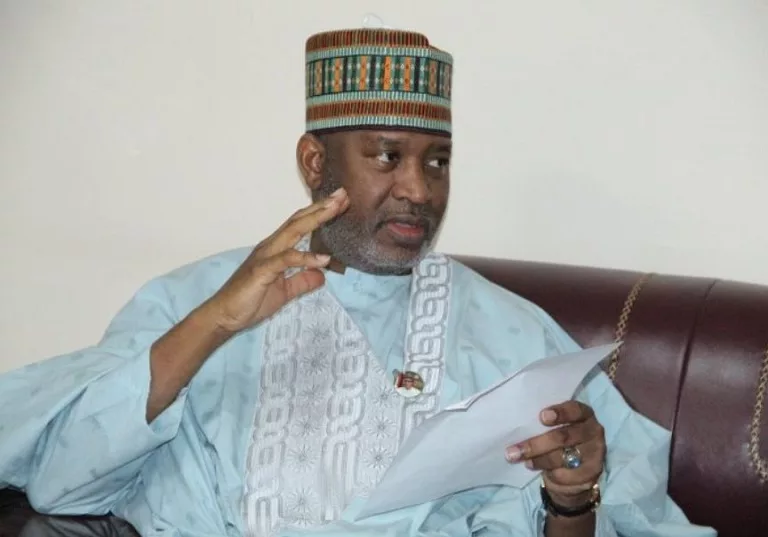There are notable concerns in the nation’s aviation sector due to the inability of foreign airlines to repatriate their trade fund to their various countries of origin.
The trapped fund has been a source of concern to foreign airline operators operating in Nigeria for some years now and the non-refusal of the federal government to release the trapped fund reached a crescendo last year, when Emirates Airline announced suspension of all its flights in and out of Nigeria.
According to the airline, the inability to repatriate its trapped earnings had led to the suspension of its operation indefinitely starting from September 1, 2022.
However, last week, the airline reiterated its suspension from Nigeria, as half of its earnings released by the Central Bank of Nigeria (CBN), last year is yet to be released to them for repatriation.
In a press statement made available to NATIONAL ECONOMY, the airline said unless there is a committed strategy by the federal government to deliver concrete action for fund repatriation, air services for Nigerian travelers will continue to dwindle.
The Emirates statement reads, “It has been five months since Emirates suspended operations to and from Nigeria, and during this time we have seen little progress in the clearing of our backlog of funds.
“As of today, Emirates still has a substantial balance of blocked funds that is yet to be repatriated, and the progressive clearing of our backlog remains beset with constant delays. Today, around 50 per cent of the amount approved for clearing within our backlog is still overdue for repatriation.
“We have made many concerted efforts to enable a swift return to Nigeria. We had proposed a number of solutions and measures to recover our funds, and engaged in dialogue with government stakeholders and industry bodies. Regretfully and despite many media reports of public assurances made at the highest levels, solutions continue to be stalled. We acknowledge that the wider aviation industry and the local value chain it supports in Nigeria face a similar market reality.
“However, unless there is a committed strategy by the local authorities to deliver concrete action, air services for travelers, for businesses seeking global market opportunities and for investments – all supported through air transport and critical to Nigeria’s economic recovery – will continue to dwindle.”
The airline, however, called on the CBN to work with the airline to return to Nigeria by ensuring repatraition of its trapped funds.
“We remain committed to finding a mutual resolution with the Nigerian government and Central Bank to repatriate the rest of our blocked funds in a swift manner, and provide a roadmap that includes firm measures to prevent future repatriation accumulation challenges and delays.
“We call on them to work with us, hand in hand, to ensure Nigerian travelers and businesses have unfettered connectivity and access to our global network,” the statement reads.
But, while some section of aviation stakeholders cautioned the federal government over the consequences of withholding the airlines’ funds, others argued that Nigerians should look inward, develop its own carrier for international flight.
They further stated that most foreign airline operators are short term investors who pullout from a nation during economic downturn, as presently experienced.
Speaking on the issue, the national president, National Association of Nigeria Travel Agents (NANTA), Susan Akporiaye, said Nigerians now travel across the borders in droves to connect cheaper flights to their destinations.
According to her, the forex crisis has led to unjustifiable profiteering by foreign carriers because the lower inventories of airlines are now shut against Nigerians, but opened in other neighboring countries, thereby, forcing Nigerians to seek cheaper flights across borders.
She, however, said even though they have reached out to the foreign airline operators, their response are unconvincing, saying the fares are selfish, unreasonable and exploitative to Nigerians.
She said, “The trade rules are obnoxious, not consistent with global best practices and the fares are unjustifiably high, all in reaction to trapped funds. We at this stage have reasons to believe there is more to it. The fares and practices are strangulating and our Nigerian regulations is not deployed. No power of authority in Nigeria is presently holding back the rampaging practices of airlines and we regret to say NANTA members are not protected by government in this circumstances, neither is the Nigerian public.
“The implication of Nigerians crossing the borders to join international flights is obvious. We lose business because the sales won’t be attributed to any traveling agency. The government will lose as well because the government will lose the 5 per cent Nigeria taxes on the ticket. Definitely, it will come down to ripple effect of loses to the industry.”
The president of the travel agency, however, stated that the foreign airlines haven’t increased fare, rather, they shutdown lower inventories against Nigerians and travel agents.
“The fare hasn’t increased. Just that the lower inventories have been taken out from Nigeria market but they existed in those other countries. The N300, 000 fare that we can’t get in Nigeria, they are getting it in neighbouring countries. Now, let’s do the mathematics, N300, 000 to N3million. They won’t mind going to other neighbouring countries to fly out especially if it’s not too far and it won’t cost them much.
“We are selling our opportunities to other countries and that’s not fair because we can’t continue to give out our benefits, we are selling our rights to neighboring countries.
“To put this in perspective, all low-fare inventories of the airlines have been deliberately blocked to our members and to this market. Airlines, even after various engagements as partners, have seem not to take such relationship or business history with NANTA into consideration, rather have gone ahead to make the market extremely difficult for members and in effect expensive for travelers.
“This now means, Nigeria is at a disadvantage since the airlines seems to have mastered the art of exploiting the Forex issue to their advantage.”
On his part, a former secretary-general, Nigerian Union of Air Transport Employee (NUATE), Com. Abioye Olayinka, said aside from other foreign airlines following suit, there would be job loss as Nigerians working with the airlines will lose their jobs.
According to him, the airlines would as well move to neighboring West African countries where Nigerians will be forced to travel to connect their various destinations.
He said, “I am very much aware that the Nigerian government has been unfair to these foreign airlines. They have been acting in an unwholesome manner to foreign airlines by trapping their funds with the CBN. Investors expect that when you work in an environment such as ours, you will be able to repatriate your funds as you make them, but for reasons best known to the government, monies that foreign airlines and other investors have made in Nigeria are being trapped without any recourse to repatriate their money back to their home. That is not only unacceptable, but fraudulent act on the part of the federal government.
“I recall that some years back, I raised this issue with the federal government through the minister of aviation that the Nigerian workers who are members of our union and working with these foreign airlines are liable to lose their jobs. If a company makes money in Nigeria, they should be allowed to repatriate their funds home because if they closedown or suspend their operations, the Nigerian workers will suffer the consequences and this will not encourage other foreign investors coming to make investment in Nigeria for fear of their money being trapped.”
He, moreover, called on the Federal Ministry of Aviation to liaise with the finance counterpart on how to release the trapped fund in the country’s economic interest.
“It’s going to be a terrible thing and a colossal loss to Nigerian flying public as they would be forced to travel to Dubai and those who want to connect their flights outside Dubai vis a vis Nigerian workers employed by this foreign airlines will all be affected.
“My appeal to government is to please prevail on minister of finance to do the needful otherwise the consequences of their failure to allow foreign airlines repatriate their funds back home will be calamitous.
“Very many foreign airlines who are portfolio airlines have nothing to lose by closing shops here and going elsewhere and the next available station for them is Ghana. They will move out of Nigeria and go to Ghana and be doing their business while Nigerian passengers will travel from Lagos or Abuja to Ghana to join Emirate airline and I can tell you that the Ghanian government will not trap their fund and Nigeria government doing so have no reasons doing so.
“It doesn’t make any economic or political sense in fact, it’s giving Nigerians a very negative impression in the comity of nations, so if Emirate that is about number one among foreign airlines doing business with us suspends its operation here you can be sure that Qatar Airways, Turkish, British Airways will follow suit and Nigeria will become a pariah nation.”
Also, the Aviation Safety Round Table Initiative (ARTI), has urged CBN to ensure prompt release of the foreign airlines’ trapped fund.
The association in a statement by the association’s secretary general, Olumide Ohunayo, expressed dismay over the handling of the matter by the federal government, adding that the whole scenario portrays a sector that is in need of urgent intervention.
“ARTI is dismayed by the appalling handling of the accumulated foreign airline funds trapped in our banks, due to the non-allocation of forex to these airlines. In all Bilateral Air Services Agreement (BASA), an article in the agreement — transfer of earnings, clearly states that ‘each designated airline shall have the right to convert and remit to its country on demand, local revenues in excess of sums locally disbursed. Conversion and remittance shall be permitted without delay in accordance with the prevailing foreign exchange regulations.
“International trade is binded by agreements which are sacrosanct and respected. Nigeria cannot do otherwise if we crave the attention of investors in our industry. It’s important to state that foreign airlines sold these tickets at the official IATA rate and cannot be expected to go the parallel market to source, convert and remit as opined in some quarters, the central bank should do the needful as enshrined in the BASA agreements. These funds should have been remitted at the official rate on date of sale immediately the airlines get clearance after paying all the local obligations including taxes.”
Ohunayo noted further that the action of government on the matter has affected the country’s image as a country that is not investment friendly.
“The damage that our action has done to the Nigerian image as an investment friendly nation is far reaching, while the citizenry is faced with high fares, reduced capacity and limited travelling options, which will worsen if we continue on this trajectory. We found ourselves in this unenviable situation because we lack capacity to compete, which would have reduced the remittance volume.
“The unborn Air Nigeria cannot produce this capacity, irrespective of the funds allocated, but by an aggregated process of developing our industry to produce vibrant flag carriers that will be courted for commercial partnerships which is the purveyor for successful international flight operations. We are also of the opinion that to kick start this process, a functional and credible data gathering methodology for the industry is a necessity. We cannot continue to blow hot air without verifiable data,” he said in the statement.





